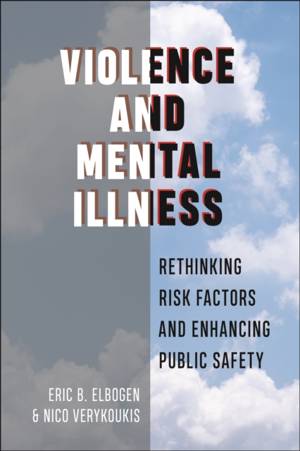
- Afhalen na 1 uur in een winkel met voorraad
- Gratis thuislevering in België vanaf € 30
- Ruim aanbod met 7 miljoen producten
- Afhalen na 1 uur in een winkel met voorraad
- Gratis thuislevering in België vanaf € 30
- Ruim aanbod met 7 miljoen producten
Zoeken
Violence and Mental Illness
Rethinking Risk Factors and Enhancing Public Safety
Eric B Elbogen, Nico Verykoukis
€ 150,95
+ 301 punten
Uitvoering
Omschrijving
Shows that the myth that mental illness is strongly linked to violence makes us all less safe
Mass shootings have become a defining issue of our time. Whenever the latest act of newsworthy violence occurs, mental illness is inevitably cited as a preeminent cause by members of the news media and political sphere alike. Violence and Mental Illness: Rethinking Risk Factors and Enhancing Public Safety exposes how mental illness is vastly overemphasized in popular discussion of mass violence, which in turn makes us all less safe. The recurring and intense focus on mental illness in the wake of violent tragedy is fueled by social stigma and cognitive bias, strengthening an exaggerated link between violence and mental illness. Yet as Eric B. Elbogen and Nico Verykoukis clearly and compellingly demonstrate in this book, a wide array of empirical data show that this link is much weaker than commonly believed--numerous other risk factors have been proven to be stronger predictors of violence. In particular, the authors argue that overweighting mental illness means underweighting more robust risk factors, which are external (e.g., poverty, financial strain, inadequate social support), internal (e.g., younger age, anger, substance abuse), or violence-defining (e.g., lacking empathy, gun access, hate group membership). These risk factors need to be taken into consideration when crafting policies that concern public safety, with emphasis on strategies for reducing the viability and acceptability of violence as a choice.Specificaties
Betrokkenen
- Auteur(s):
- Uitgeverij:
Inhoud
- Aantal bladzijden:
- 208
- Taal:
- Engels
- Reeks:
- Reeksnummer:
- nr. 13
Eigenschappen
- Productcode (EAN):
- 9781479801442
- Verschijningsdatum:
- 8/08/2023
- Uitvoering:
- Hardcover
- Formaat:
- Genaaid
- Afmetingen:
- 152 mm x 229 mm
- Gewicht:
- 449 g

Alleen bij Standaard Boekhandel
+ 301 punten op je klantenkaart van Standaard Boekhandel
Beoordelingen
We publiceren alleen reviews die voldoen aan de voorwaarden voor reviews. Bekijk onze voorwaarden voor reviews.











